|
Readings PIIGS 2014 Resgate (‘Ransom’), by Armando Nascimento Rosa, puts the banking corruption as the axis that articulates the dramatic action. The kidnapping of a banker and his secretary triggers a speech in which the urgent need of the individual meets with the big financial interests. No reconciliation is possible. Nascimento mixes farce with political theatre, in a play in which the urgency and seriousness of the approaches of the characters coexist with the comic unreality of the moment.
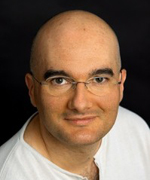 |
Autor
Armando Nascimento Rosa
Award-winning Portuguese playwright (Ribeiro da Fonte Revelation Theatre Award in 2000; Albufeira Prize for Drama in 2008; Bernardo Santareno National Theatre Award, in 2011, etc), is the author of more than 20 original plays, most of them published and translated into different languages with full productions and/or staged readings in cities of Europe and America. Since 1998, Armando (Ph.D in Dramatic Literature) has been a professor at Lisbon’s Escola Superior de Teatro e Cinema (Lisbon’s Faculty of Dramatic Arts and Film). He is also a singer/composer now engaged in the project O Piano em Pessoa / A Piano in Pessoa, which turns into music poems by multilingual modernist author Fernando Pessoa, a show he premiered October 2012 in Spain, with pianist António Neves da Silva, at The University of Barcelona. |
 |
DirectoraAdeline Flaun
Director, actress and broadcaster. Born in Martinique (French Caribbean), arrived in Barcelona after a while in Lille (France) where she founded her first company. She studied performance at Moveo and Javier Galitó-Cava, among others, and followed workshops at the Obrador-Sala Beckett (Victoria Spuntzberg Davide Carnivale…).
Work with directors like Frederic Roda, Josep Pere Peyró, Angels Aymar, Nicolás Rivera, Quique Culebras Javier Galitó-Cava, among others.
She creates the company ALMARADAS with which works with texts engaged with society: El soroll dels ossos quan cruixen, Moi, Edouard Denan, Umbral, El Ausente. |
 |
ActorsIldefons Vilanova
Sonia Espinosa
Toni Climent
Salva Soler
Translator
Pau Segalés (Instituto Camões de Barcelona) |
Readings PIIGS 2014 The play Dayshift (‘Torn de dia’), by Darren Donohue is a choral work in which references to Kafka and Orwell coexist. In Dayshift, the company becomes the symbol of oppression of the individual. Oppression grotesquely disguised as salvation, trying to convince the worker that within the company headquarters, he will find a full meaning to his existence. Standardization of all differences, inability to communicate, futility of entertainment to achieve happiness are the resources of the modern working life. Day, the main character, in the course of a single day, from dawn to dusk, reminds us the initiation trip of Leopold Bloom of Joyce. But while one walks around Dublin during that sixteen of June, Day remains closed within his company.
 |
AuthorDarren Donohue
Darren is an award winning playwright/poet currently based in Co. Kilkenny, Ireland. In 2013, he was commissioned by The Abbey and his play – ‘Home Game’ was presented at The Peacock as part of their Home series. Also in 2013, his play – ‘Keep the Home Fires Burning’ won the Audience Choice Award @ Scripts, Ireland’s Playwriting Festival. In 2012, his play – ‘Tuesday Evening (following the news)’ was produced by Fishamble (the new play company) as part of ‘Tiny Plays for Ireland’ and recently published by New Island Drama. Directed by Alice Malin, his play – ‘The Bird Trap’ was produced by Three Streets at The Lost Theatre, London. Interview with teh author …
1.-How did the idea of writing this play come to you?
With “Dayshift” I wished to explore the consequences of sacrificing our common morality upon the altar of materialism. It looks at what happens when the human spirit in placed within an environment where everything is for sale and nothing has value. I utilised a strong experimental style, rich in imagery to tackle this issue.
2.-To what extent do you think this reflects the current situation in your country?
With the collapse of the Church in Ireland, materialism filled the spiritual void in our society. The “Things” people owned, their occupation and the pursuit of wealth gave people a new purpose and meaning to their lives. Of course, with the economic crash, all these newfound certainties were once more throw in the air. “Dayshift” reflects and explores this process using humour and an avant-garde approach to theatre.
3.-How would you define your style of writing?
I like to write toward an image, using dialogue and humour to disarm and hypnotise the audience, preparing them to accept the image I’m attempting to convey. A potent image can define a culture and a nation, become a compelling symbol of how we understand and relate to each other.
4.-What is theatre for you?
Theatre is our gateway into the marvellous.
5. Is there a relationship between the journey of alienation suffered by Mr Day and your daily life as a playwright?
The artist is always an outsider in society. This positon grants them an original perspective which filters into their work. In all my plays, I try to reimagine the world and our place within it. I want to sink beneath the surface of “everyday reality” to pluck at the delicate treads which keep us tethered to hope and salvation. |
 |
DirectorMarilia Samper
She is actress, director and playwright. Born in Sao Paulo, Brazil. Settled permanently in Spain after living in different countries. Study performance at the Institut del Teatre in Seville, and works with various companies in the city, such as Viento Sur Teatro, La Matrona and Centro Andaluz de Teatro. Study director and playwright at the Institut del Teatre of Barcelona. Since then she has developed her career as writer and director, and has been represented on stage in most emblematic spaces of Barcelona.
Among her texts are: Pequeños Monstruos (Ivanow Festival Grec 2013), Udol (Teatre Lliure, Ars Theatre Q-2012), L’ombra al meu costat (T6 Project, TNC 2012 ), Pleasure and Pain (Beckett Barcelona 2011), among others. Among her directions, Pulmons by Duncan Macmillan (Beckett 2014), Si existeix encara no ho he trobat by Nick Paine (Sala Beckett 2013), Suïcides by Llàtzer Garcia (Teatre de Bescanó 2012). |
 |
ActorsTeatre de l’Enjòlit.
Company of actors formed by Elies Barberà, Albert Alemany, Marta Montiel, Jenny Beacraft and Arnau Marín. Among their shows are Potser somniar, En La Primavera perpètua by Elies Barberà, Corrüptia by Josep Lluís Fitó, Paella amb Botifarra by Iban Beltran and Elies Barberà, Si no ens paguen, no paguem! by Dario Fo and El setè cel by Caryl Churchill. |
|
Translator into Catalan:Rocío García Recuenco |
Readings PIIGS 2014 Confessió (‘Confession’), by Davide Carnevali, is a subtle reflection on the mechanisms of power, their self-justifications, perception and the role of voter seen from the perspective of a leader, democratically chosen, who do not respect democracy. Carnevali possibly hit the nail on the head when focused his speech at the core of the perversion of the system, because it is from there where economic and political relations inevitably pervert.
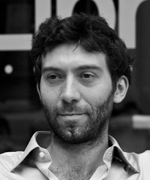 |
AuthorDavide Carnevali
Davide is a PhD in Performing Arts at the Universitat Autònoma de Barcelona. Translator of Spanish and Catalan into Italian and teacher of theory of theatre and drama writing in several workshops. Also writes for various theatre magazines. Among his plays are: Variazioni sul modello di Kraepelin (Theatertext als Hörspiel/Theatertreffen Berlín Prize 2009, Marisa Fabbri Award 2009, Journées de Lyon Prize 2012); Come fu che in Italia scoppiò la rivoluzione ma nessuno se ne accorse (Scintille Asti Teatre Award 2010, Borrello Award 2011); Sweet Home Europa (European premiere at the Schauspielhaus Bochum 2012); Ritratto di donna araba che guarda il mare (Riccione Prize per il Teatro 2013). His works have been shown at various international reviews and have been translated into German, Spanish, Catalan, Estonian and Flemish. Entrevista amb l’autor …1.-How did the idea of writing this play come to you?
When I was living in Buenos Aires, I lived near Congreso, the Argentine parliament, a few minutes walk from the Casa Rosada, the executive mansion of the President, and from the Museo del Bicentenario, which traces the political history of the country from its birth until today. The Argentine politics is a fascinating subject, as well as his greatest mystery, the Peronism. A label that somehow unifies a wide sort of opposed political strategies, for example that of Kirchner and that of Carlos Menem, the president who, from 1989 to 1999, shaped the image of the Argentina before the crisis. A country which was rich, neo-liberal, cool; a country who aspired to the ethical and aesthetic model embodied by its chairman. A president who brought the country to the brink of the abyss, and dropped it, without anybody noticed. That’s fascinating, in my opinion: how a president can distract his country and make the truth go unnoticed.
2.-To what extent do you think that reflects the current situation in your country?
The economic crisis we are experiencing in Europe resembles that experienced by Argentina a decade ago. In both countries a macroeconomic policy that leads to loss of monetary sovereignty has been pursued. Although there are differences in comparing the Dollar, a foreign currency, to the Euro, which is a common currency, whereby each country should, ideally, has power of decision on it. The truth is that the ECB is quite influenced by the decisions of the Bundesbank and the German political weight. As a result, the countries that suffer most from the crisis (Greece, Portugal, Ireland, Italy, Spain) have very little autonomy in financial management, and that somehow reminds the dependence of Argentina to the USA and the IMF in those years. When a country has no autonomy in terms of monetary policy, it can only cut costs, privatize, dismiss the social system. Hence elected governments lose all effectiveness and prefer to declare a sort of “state of emergency” leaving political liability side of an assumed financial responsibility.
3.-How would you define your style of writing?
This play is very different from what I’m used to write. In open opposition to the political rhetoric (and therefore in some way to the theatrical rhetoric), the story is flowing clear, simple. It has been conceived as an Argentinian “unipersonal”, a monologue for one actor, easy to stage and easy to move, with no need of money to do it, nor complicate technical requirements.
4.-What is the theatre for you?.
Theatre is the only art in which the clash between word and body, between reality and discourse about reality, happens live in front of the public. Thus theatre is a powerful tool to explore the method of construction of reality through language.
5. What has Carlos Menem of Silvio Berlusconi and S.Berlusconi of C.Menem? And to what extent have you used both to create a syncretic character like “Menem” of Confessione ?.
There are many similarities between Menem and the figures of Silvio Berlusconi or José María Aznar, for example. They are all rich, powerful, friends of magnates and tycoons. They are all faithful to the liberal doctrine of the United States. They are all graduates in law, and, paradoxically, all of them were somehow beyond the law. And most importantly, they knew how to exploit their image, building through the medias an “attractive” character to the citizens’ eyes. |
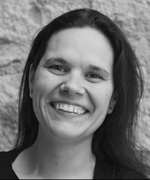 |
DirectorBeatriz Liebe
Universidad Católica de Chile. Combine her work of stage director with cultural management in different organizations: co-directs the platform to promote dramatic authorship “perpetuum” (www.perpetuum.cat), artistic director of the company Tuvalú productions (www.tuvaluproduccions. com), project manager at the Fundació Xarxa (www.fundacioxarxa.cat) and executive producer of l’Altre Festival of scenic arts and mental health (www.laltrefestival.cat).
Since 1997 has participated in more than 25 theatre plays, cinema, opera and performance, including: Dow Jones (Vallromanes, 2013), Divisions (Ivanow, 2012. Avignon Off Festival 2013 – Program Avignon à la Catalane), Alades Paraules (Convent of St. Agustí ’09, Award for best project of visual theatre, Theatre School ’09), Mon Amour (Regional Museum Montsiá. Strobe Festival ’08), Los Niños de Morelia (Barcelona and Spanish tour ’08-’10), among others.
Creator and organizer of the Festival PIIGS, along with Rosa Moline and Antonio Morcillo and the platform of dramatic authorship “perpetuum” (www.perpetuum.cat).
She was in charge of the direction of the play Confessió of Davide Carnevali. |
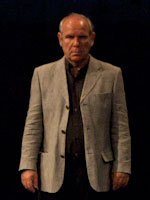 |
Actor
Xavier Capdet
Translator
Angelo Costantini (Istituto Italiano di Cultura di Barcellona)
|
Readings PIIGS 2014 In the play Στεγη (‘Roof‘) by Maria Tranou the humour is extremely black, and the situation and language flee realism to take refuge in Beckett. The reader does not know exactly what is going on in the house of this Greek family. The story is dislocated, just like the characters, who are also dislocated by food and vital deficiencies they are suffering. The thoughts “jump” of the characters correspond to the lack of logic narrative in use. Even so, violence and degradation are relentless making their way.
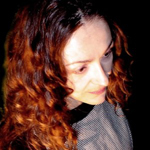 |
AuthorMaria Tranou
Maria Tranou studied Writing for the Stage and Broadcast Media at the Royal Central School of Speech and Drama, University of London. Her plays include Cows, (Theatro tou Neou Kosmou, Athens, 2007), Rebirth (Heraclion City Walls, Crete, 2009) New Dad (Battersea Arts Centre, London, 2010), Îœammal, love, (staged reading by the Factory Theatre, 2010) and scripts for Dimitris Fotiouâs online works Dystypia and This is Your Home Now. In 2006 she was awarded the Greek Ministry of Culture 1st prize for writing Where Liromions Grow, a play for children. Published work includes two poetry books (Mandragoras Publishing House, 2008 & 2013). Interview with the author …
1.How did the idea of writing this play come to you?
There is not a single Greek I have met (this definitely excludes the upper echelons as they inhabit a different universe internationally anyway) who will not admit to a constant feeling of being severely violated, more degradingly so during the last few years. Any sense of hope or prospect of some sort of future or even present has been violently extinguished. I needed to show how organic, incessant and ruthless this degradation is and more importantly how distorting its effects are on our essential humanity. Because a financial crisis, be it real or a construct, is one thing, but what it does to people and their human values is even more disturbing. Internalising the we-are-good-for-nothing-propaganda, facing a state that in all its dealings considers citizens as guilty of still surviving, only adds to how suffocating the current condition is to any human being. The crisis manifested itself by the stripping off of possessions and basic standard of life but continued its effect, via the always classic, but so well-orchestrated “divide and conquer” rule to a splitting of society into scared individuals and ultimately to a stripping of minimum human values. At the same time, luckily enough, there is memory of times where our basic decency was not perfect, but definitely there, as an intrinsic part of our lives. This is where the characters in my play come from.
2.-To what extent do you think that reflects the current situation in your country?
What I described above is the mechanism that I have been witnessing throughout these years, though its seeds were there all along. In stages it has been like this: media spreading worry and eventually terror as to the country’s future, the official state relaying and investing on the all-important central european message of how “bad” we have been, media highlighting how overprivileged some professional groups have been, people getting more and more the sense that their enemy is basically everyone else. Under this widespread fear and utter mistrust of any other person, the average person now acts as if the enemy is someone next door. The mere experience of existing in this country has blindsided us to the fact that the enemy might be above us, not next to us. When you take these factors into account, this play is hardly a surrealist take on what is going on.
3.-How would you define your style of writing?
I have come to realise that every time a new content comes up with its mysteriously to me preordained form. Every time the content somehow dictates its style of preference, it is like a condition I have to follow up every single time I start working on a play. So all I can say about my style is that it always strives towards serving and highlighting the content to its best effect. Having said that, if I had to use the usual terms, I’d say realism does not cut it for me, I’d even go as far as saying that realism is not enough for a theatre that is interested in social change. It has been my impression that most times, deliberately or not, realism works as a reaffirmation of our inherently violent bourgeois existence, comforting the audience to a point that is ideologically questionable. I need to be unsettled by the theatre, not reassured that my life is better than that of the fictional characters. I’d rather feel more alive and aware than before so this essential need informs and shapes whatever I write in any medium or format.
|
 |
DirectorAntonio Morcillo
Director and playwright educated at the Institut del Teatre of Barcelona and participated in various seminars taught by Martin Crimp and Yves Lebeau, among others. Among his writings include Bangkok (SGAE theatre prize 2013), Dow Jones (Vallromanes Theatre, 2012), Al Hoyo(published in the theatre magazine ADE 2009), El Tiovivo (published by the AAT and premiere at the 32nd Sitges International Theatre Festival in 2001 and Tantarantana Theatre, 2004), Firenze (published by Arola editors 2003 and staged reading at Sala Beckett 2008), En experimentos con ratas (SGAE theatre prize 2007), Despedida II (SGAE theater prize 2001) and Los Carniceros (Marques de Bradomín theater prize 1998), among others.
Among his directions are included: Dow Jones (co direction with Beatriz Liebe, Teatre Municipal Vallromanes 2013), Hipòlit o la mirada d’Hipòlit (Teatre Municipal Vallromanes 2011), A dues bandes (Caixa Forum auditorium 2010), Aoi (Caixa Nova, Vigo 2010) among others.
He is currently the artistic director of the promotional platform of dramatic authorship “perpetuum” (www.perpetuum.cat) and teacher of writing and oral skills at The National Distance Education University (UNED).
Together with Rosa Moliné and Beatriz Liebe is the creator of the Festival PIIGS and its organization. He directed the staged reading of the play Teulada of the greek author Maria Tranou. |
 |
Actresses:
María Ramírez
Melisa Fernández
Laura María González
María Rodríguez
Joan Pascual
Traduction
Marta Torras
Marta Roigé |
Readings PIIGS 2014 La crida (The call) collects poetic echoes of Koltès to make a call to the society which in turn, is threat and help. Ferran Joanmiquel reflects Catalan today and goes deeply into the causes for xenophobia. Political speech and mental repression continually merge and separate in this cry of pain and exclusion. Fear and attraction to the Other cause friction inside the character: the only language can do is to expose the beauty and horror of the conflicte.
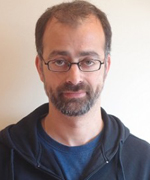 |
AuthorFerran Joanmiquel Pla
He is trained as actor at the El Galliner School of Girona, and contemporary dance in the Area and La Caldera centres. He works as a dancer in the companies Búbulus Menuts and Iliacan, and as an actor in various productions. He studied dramaturgy in different courses in the Casa de Cultura of Girona and Sala Beckett Obrador. Several of his writings have been awarded. Some of his works are released: Apareguda (Banyoles 2011), Dinou (directed by Carles Fernández Giua, Temporada Alta Festival 2011), and with the company El Mirador in La Sala Plantea of Girona: Satori Park (2010) and Desitjar viure en un pais sense vent (directed by Sílvia Escuder, 2012), and La nit dels ganivets roents (directed by Elies Barbera, 2014). He also directed the monologue Vidres als ulls with the company Cos a Cos (La Planeta 2013). Interview with the author …
1- How did the idea of writing this play come to you?
Ja feia temps que tenia al cap d’escriure alguna cosa sobre un personatge reaccionari. Al principi havia de ser una dona i la història havia de tenir alguna mena de relació amb el moviment francès conservador “Manif pour tous”, però la cosa va anar evolucionant fins a arribar a l’actual personatge de La crida. El fet d’adonar-me que l’extrema dreta està experimentant un creixement notable en diversos països europeus em va fer decantar definitivament per aquesta opció.
2- To what extent do you think that reflects the current situation in your country?
Tenia clar que no volia parlar de quelcom que pogués ser entès exclusivament en una clau estrictament catalana, sinó que volia reflexionar sobre el fet de la crisi econòmica des d’un prisma més global (europeu) en el sentit que el tema pogués representar també d’altres realitats europees. Alhora, he defugit deliberadament de voler “retratar” el feixisme espanyolista perquè com a català era massa fàcil caure en aquesta temptació i crec que hagués estat un error. Evidentment que també existeix un feixisme ultra nacionalista català (representat per exemple per Plataforma x Catalunya i les seves escissions). També cal dir que el text està pensat de manera que cada país pugui adaptar els seus referents socioculturals més emblemàtics. El fet que quan hi ha dificultats econòmiques hi ha la tendència de “tirar pilotes fora” i fer culpable a l’altre, malauradament, em sembla que és força comú i representatiu de varis països, i del nostre també, per descomptat.
3- How would you define your style of writing?.
D’entrada diria que tinc una tendència natural a fugir del realisme. M’atrau allò poètic, amb uns personatges que tinguin els peus ben posats a terra però que siguin capaços de fer escapades líriques, ja que sóc del parer que aquests tipus d’introspeccions ajuden a entendre (encara que no sigui d’una manera explícita i racional) el món interior dels personatges, i a nivell d’escriptura et permet apuntar cap a llocs no convencionals. M’agrada que cada text que escric sigui diferent de l’anterior, en la forma i el contingut. En el cas de La crida, un gran referent ha estat, sens dubte, Koltès.
4- What is the theatre for you?.
Per mi el teatre és bàsicament un mirall. Un mirall que ens retorna la imatge d’allò que som i d’allò que fem com a individus i com a societat. Perquè en el teatre experimentem la paradoxa que vivim en la vida real però d’una manera molt més concentrada, com si fos una mena de vida elevada al cub. Per mi el teatre és també joc, metàfora, alguna cosa que es fa artesanalment, amb amor i respecte. En La crida hi ha, de fet, aquesta voluntat de voler ser una mena de mirall en el qual el públic s’hi pugui reflectir, ja que el més important de l’obra no és tant parlar de la perillositat de l’ascens de l’extrema dreta a Europa (que també), sinó que ens adonem que de prejudicis, qui més qui menys, en tenim tots, i això és quelcom que hem de saber encarar.
5- To what extent did you want to write a warning to the public and to what extent a story to understand your character?.
Jo crec que les dues coses van de la mà, és a dir, per una banda a La crida hi ha una voluntat de dir ei, al lloro, que aquesta gent està situant-se en els parlaments de molts països europeus, hem d’anar en compte, una voluntat d’advertència, però també hi ha la voluntat de voler entendre (que no de justificar) el protagonista des de la seva vessant més propera i humana, sinó, em faria l’efecte que com a autor estaria prejutjant massa el personatge i això no em permetria escriure amb prou llibertat.
|
 |
DirectionEster Nadal
She is actress, director and drama teacher. She studied at the Institut del Teatre of Barcelona and El Col·legi del Teatre of Barcelona, where she currently teaches regularly. Certified at the International Theatre School Jacques Lecoq in Paris.
She has worked as an actress in several plays under the direction of directors such as George Mesalles, Calixto Bieito Yvette Vigatà and Joan Ollé and as assistant director with Jordi Mesalles, Calixte Bieito, Yvette Vigatà i Joan Ollé. She was assistant of the director Joan Ollé for 10 years. Her collaborations have been seen at the Teatre Lliure, Teatre Romea, Festival Grec and Temporada Alta Festival of Girona, among others.
As a stage director has worked on shows such as El Vigilant del no res, Un tramvia anomenat desig i Badomies and moviments musicats de cinc faules de La Fontaine, produced by Escena Nacional d’Andorra. These shows have been seen in Andorra, Blanes, Barcelona, Paris and Foix.
She is the founder and Artistic Director of the Fundació Escena Nacional d’Andorra from 2007 until 2012, organization sponsored by the Government of Andorra, Andorra Credit Foundation and La Massana. |
 |
Actor
Jordi Subirà |
|

















